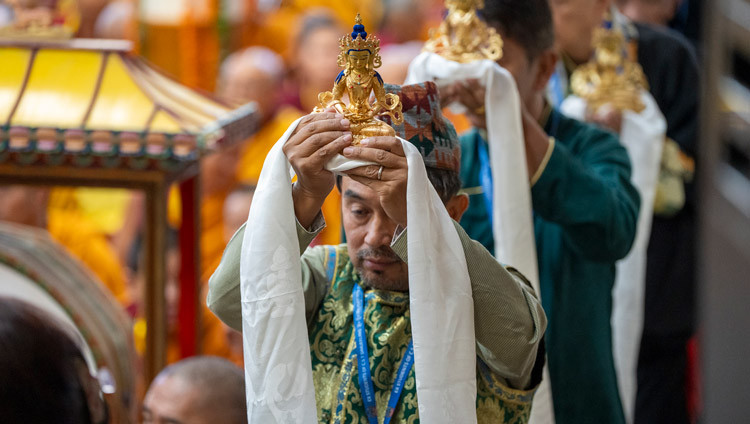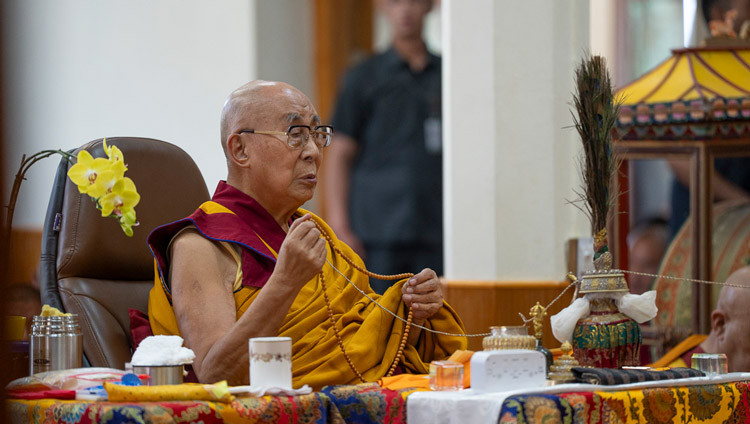Public Talk in Pisa Square and the Opening of a Mind Science Symposium
September 20, 2017
After a brief introduction from Filippo Scianna, Director of the Lama Tzong Khapa Institute, Mayor Filippeschi welcomed His Holiness to his city. Addressing the theme of the meeting, he suggested that while the internet has brought many advantages, we may be becoming slaves to information and its commercial exploitation. He said we need to be concerned about so much power in the hands of so few.
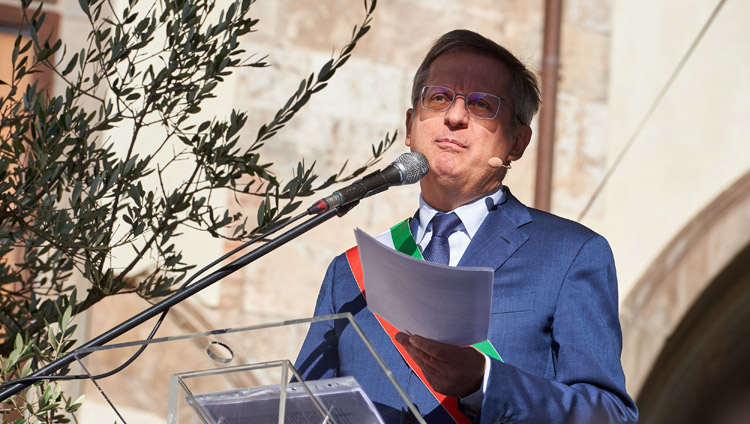
Today, His Holiness chose to stand as he spoke so he could see the students sitting further back in the square. He greeted them as brothers and sisters and expressed his gratitude to those who had organized the occasion.
“We are still in the early years of the 21st century. People’s standard of living and the level of technological development have increased, but the question is whether we are happier as a result. The wish of all 7 billion human beings alive today to live a happy life is contradicted by the fact that many of the problems we face are of our own making. When our minds are dominated by destructive emotions like anger and fear we can’t make proper use of our intelligence, tending instead to make trouble for ourselves. We need to examine how this comes about.
“There’s violence in the Middle East and North Africa. Children are starving in Yemen. In Myanmar, a Buddhist country, Muslim brothers and sisters are suffering at the hands of Buddhists—it’s all very sad.
“Because our existing education system is oriented towards material goals, people neglect their inner world. They don’t know how to bring about peace of mind. You can’t buy it in the supermarket and you can’t find it by taking drugs or undergoing a surgical operation.
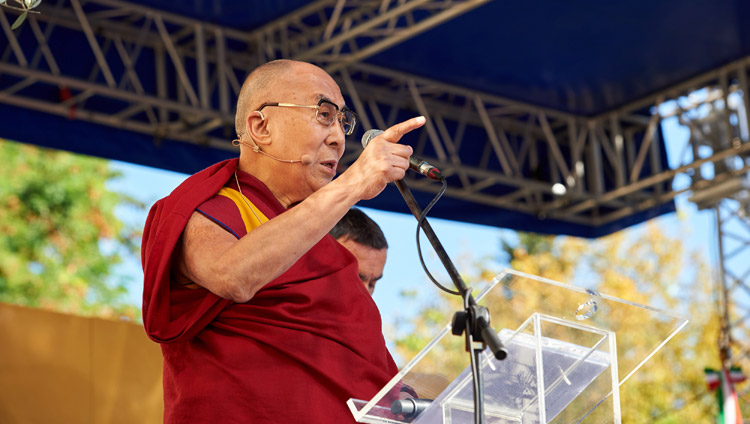
“On the one hand we enjoy sensory pleasures like watching sport and listening to music. But anger and fear are mental experiences; they don’t belong to the sensory realm. So the real trouble is in the field of emotions. I tell people that if they really want to find happiness and joy, they need to address the mental as well as the physical level.
“Just as we take care of our physical health by observing physical hygiene, we need to cultivate emotional hygiene if we’re to secure peace of mind. Since many of the problems we face are related to our minds, it’s in our minds that we must find a remedy. This is simply a matter of physical and mental well-being.
“Fear and anxiety easily give way to anger and violence. The opposite of fear is trust, which, related to warm-heartedness, boosts our self-confidence. Compassion also reduces fear, reflecting as it does a concern for others’ well-being. This, not money and power, is what really attracts friends. When the mind is compassionate, it’s calm and we’re able to use our sense of reason intelligently. When we’re under the sway of anger or attachment, we’re limited in our ability to take a full and realistic view of the situation.”
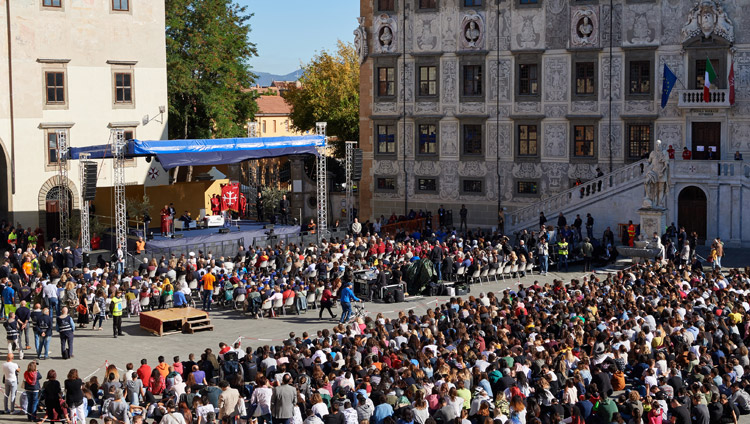
Speaking directly to the students His Holiness remarked that he and the older members of the audience belonged to the 20th century, a time that has gone. Belonging to the generation of the 21st century, he told them they were the future of the world.
“Don’t follow the pattern of the 20th century, be more realistic, more holistic—take a broader view. Take into account the inner world of the mind and think about how to ensure both physical and mental well-being. Remind yourselves of the oneness of all 7 billion human beings. Basic human nature is compassionate. If you can cultivate that with intelligence, you’ll be able to create a happier, more peaceful world.”
In answering the audience’s questions, His Holiness agreed that prayer and meditation can be used to promote positive emotions that are relevant today. Of the two main approaches to meditation, concentrative and analytical, His Holiness has personally favours analysis. He pointed out that whether actions are positive or negative depends on their motivation. He observed that since millions have found peace of mind in their religious practice, it’s wrong to refer to Muslim or Buddhist terrorists. When terrorists engage in harmful behaviour, they desert their faith.

Prompted by a young girl’s question about the role of women His Holiness wondered whether, if more countries were led by women, the world wouldn’t be a more peaceful place. He told her that on this point Mary Robinson had referred to him as a ‘feminist Dalai Lama’.
After lunch hosted by the University of Pisa at the Pisa Congress Hall, His Holiness attended the opening of the 1st Symposium of ‘The Mind-Science of Reality’. Prof Bruno Neri and Director of the Lama Tzong Khapa Institute gave introductions in which they appreciated His Holiness’s presence. Richard Gere declared it an extraordinary honour and joy to be with him at Galileo’s university. He also commended the Rector, Paulo Mancarella for steadfastly resisting Chinese pressure not to hold the event, which evoked strong applause.
Mancarella, for his part, expressed pride that the memo of understanding between Pisa University and the Lama Tzong Khapa Institute had finally borne fruit. He declared the Symposium open.
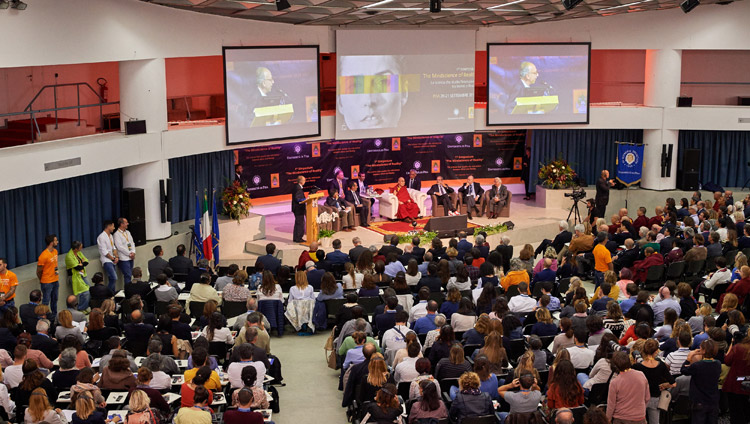
Michel Bitbol acting as moderator of the first session offered His Holiness the opportunity to comment before the presentations began.
“I view this occasion as having two purposes,” His Holiness replied. “The first is to extend our knowledge. In the past, scientists have largely paid attention to external phenomena, particles and so on, but not the mind. Consequently, many of them deny the mind any status other than as a function of the brain. As the 20th century gave way to the 21st, they began to view mind in a different light.
“The second purpose is related to promoting secular ethics, the introduction of universal values into education based on common experience, common sense and scientific findings.”
His Holiness repeated a question he has asked before. He wonders whether the insight quantum physicists have gained about nothing having objective existence has bearing on their response to their own emotions.
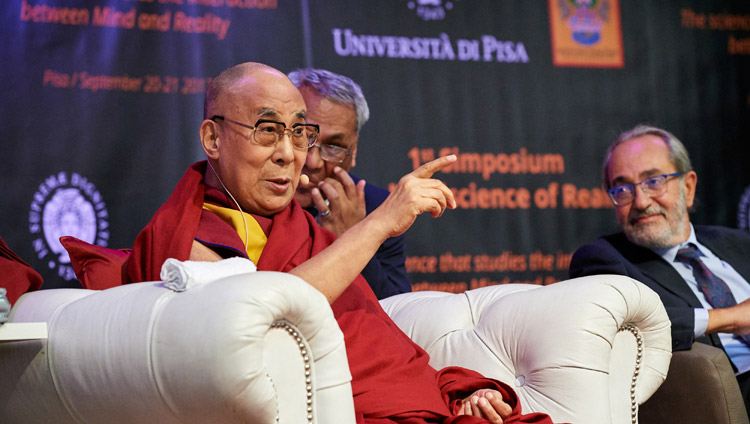
In the initial session on ‘Mindscience and Quantum Physics’, the first presenter was Prof Giuseppe Vitiello who spoke about ‘Matter, Mind and Consciousness: from information to meaning’. He noted that the physicist’s tool of mathematics cannot be used because mind and brain are open systems.
Prof Massimo Pregnolato spoke next on ‘Quantum Biology as the Basis for a New Paradigm in Psychopathology’. He explored quantum biology, quantative psychiatry and a nonalgorithmic science of mind. Lastly, Prof Federico Faggin spoke about the ‘Co-emergence of Semantic and Syntactic Realities’ in which he contrasted the two realities of our inner and outer worlds.
As the stimulating session came to an end, His Holiness expressed his appreciation to the presenters for their efforts. He questioned whether answers to the questions they pursue are yet in sight, but felt confident that in decades to come scholars and scientists will look back on this as having been a significant beginning.
The symposium will continue tomorrow with a session on ‘Mindscience vs. Neuroscience’.
Source: https://www.dalailama.com/news/2017/public-talk-in-pisa-square-and-the-opening-of-a-mind-science-symposium



